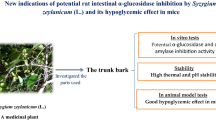Abstract
Acarbose is a glucosidase inhibitor which exerts its activities within the gastrointestinal tract of animals and humans [1]. The drug delays glucose absorption and thus represents a new therapeutical concept in the treatment of diabetes mellitus. The mean therapeutic dose is three times 100-mg tablets [2].
Access this chapter
Tax calculation will be finalised at checkout
Purchases are for personal use only
Preview
Unable to display preview. Download preview PDF.
Similar content being viewed by others
References
Puls W, Keup U, Krause HP, et al. (1980) Pharmacology of a glucosidase inhibitor. Front Hormone Res 7:235
Schöffling K, Hillebrand I (1981) Acarbose — ein neues therapeutisches Prinzip in der Behandlung des Diabetes mellitus. Dtsch Med Wochenschr 106:1083
Schlüter G (1982) Toxicology of acarbose. In: Creutzfeldt W (ed) First international symposium on acarbose. Excerpta Medica, Amsterdam
Tucker MJ (1979) The effect of long-term food restriction on tumors in rodents. Int J Cancer 23:803–807
Cheney KE, Liu RK, Smith GS, Leung RE, Mickey MR, Walford RL (1980) Survival and disease patterns in C57BL 46J mice subjected to undernutrition. Exp Gerontol 15:237–258
Weindruch R, Walford RL (1982) Dietary restriction in mice beginning at 1 year of age: effect on life-span and spontaneous cancer incidence. Science 215:1415–1418
Woutersen RA (1987) Chronic toxicity and carcinogenicity of lactitol in rats: comparison with lactose. In: Leegater DC, Feron VJ, Hermus RJJ (eds) Low-digestibility carbohydrates. Proceedings of a workshop held at the TNO-CINO Institutes, Zeitst, the Netherlands, 27–28 November 1986)
Author information
Authors and Affiliations
Editor information
Editors and Affiliations
Rights and permissions
Copyright information
© 1988 Springer-Verlag Berlin Heidelberg
About this paper
Cite this paper
Schlüter, G. (1988). Toxicology of Acarbose, with Special Reference to Long-term Carcinogenicity Studies. In: Creutzfeldt, W. (eds) Acarbose for the Treatment of Diabetes Mellitus. Springer, Berlin, Heidelberg. https://doi.org/10.1007/978-3-642-73583-7_2
Download citation
DOI: https://doi.org/10.1007/978-3-642-73583-7_2
Publisher Name: Springer, Berlin, Heidelberg
Print ISBN: 978-3-540-19145-2
Online ISBN: 978-3-642-73583-7
eBook Packages: Springer Book Archive




